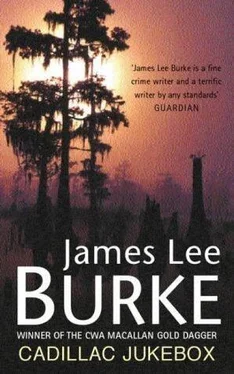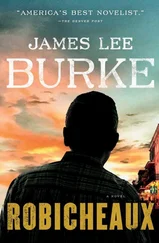James Burke - Cadillac Jukebox
Здесь есть возможность читать онлайн «James Burke - Cadillac Jukebox» весь текст электронной книги совершенно бесплатно (целиком полную версию без сокращений). В некоторых случаях можно слушать аудио, скачать через торрент в формате fb2 и присутствует краткое содержание. Жанр: Триллер, на английском языке. Описание произведения, (предисловие) а так же отзывы посетителей доступны на портале библиотеки ЛибКат.
- Название:Cadillac Jukebox
- Автор:
- Жанр:
- Год:неизвестен
- ISBN:нет данных
- Рейтинг книги:5 / 5. Голосов: 1
-
Избранное:Добавить в избранное
- Отзывы:
-
Ваша оценка:
- 100
- 1
- 2
- 3
- 4
- 5
Cadillac Jukebox: краткое содержание, описание и аннотация
Предлагаем к чтению аннотацию, описание, краткое содержание или предисловие (зависит от того, что написал сам автор книги «Cadillac Jukebox»). Если вы не нашли необходимую информацию о книге — напишите в комментариях, мы постараемся отыскать её.
Cadillac Jukebox — читать онлайн бесплатно полную книгу (весь текст) целиком
Ниже представлен текст книги, разбитый по страницам. Система сохранения места последней прочитанной страницы, позволяет с удобством читать онлайн бесплатно книгу «Cadillac Jukebox», без необходимости каждый раз заново искать на чём Вы остановились. Поставьте закладку, и сможете в любой момент перейти на страницу, на которой закончили чтение.
Интервал:
Закладка:
"How much is just the lima bean soup without the sandwich?" I asked. I had to keep my hands flat on the bar when I said it, too, because there was a wood bowl full of crackers and pickles right at the end of my fingers.
"Twenty cents," he said.
"How much for just a cup?"
"Where you from, boy?"
" Louisiana."
"Go around back and I'll tell the nigger to fix you something."
"I ain't ask for a handout."
He pulled up his apron, took a lighter out of his blue jeans, and lit a cigarette. He smoked it and spit a piece of tobacco off the tip of his tongue. He picked up the bowl of crackers and pickles and set it on the counter behind him with the bottles of whiskey and rum and tequila.
"You cain't hang around here," he said.
It had started to rain again, and I could see the water dripping off the Carta Blanca sign on the face of the dead cougar. Its eyes were seamed shut, like it had gone to sleep. A man opened the front door and the rain blew across the floor.
"How far is it to the LaRose house?" I said.
"What you want out there?"
"Mr. LaRose told me to come out."
The cigarette smoke trailed out of the side of his mouth. A shadow had come into his face, like a man who's caught between fear and suspicion and anger at himself and an even greater fear you'll see all these things going on inside him.
He walked down the duckboards and used the phone on the counter. When he put the receiver back down his eyes wouldn't stay fixed on mine.
"Mr. LaRose says for you to order up. He'll be along when it quits raining," he said. He set the bowl of pickles and crackers back in front of me, then pried off the top of a Barge's root beer on a wall opener and set it next to the bowl.
"How about a steak and eggs and those stewed tomatoes?" I said.
"Anything else?"
"How about some fried potatoes?"
"What else?"
"How come a Mexican would carry a M-1 carbine on a pipe truck?" I asked.
He leaned on the bar. I could smell soap and sweat in his clothes. "Where you seen it?" he asked.
"Coming north of the river."
"You ever heard of no God or law west of the Pecos?"
"No."
"It means you see wets, you forget it."
"I don't understand."
"It's a subject you'd best carry on the end of a shit fork," he said.
An hour later the sky was empty and dry and pale behind the hills and you could see the sage for miles when Jude LaRose pulled up next to the sidewalk in a wood-paneled Ford station wagon, leaned over and popped open the passenger door and looked at me from under the brim of his Stetson with those blue eyes you didn't eyer forget. He was a handsome man in every respect-tall, with a flat stomach, his gray hair cropped GI, his skin sun-browned the shade of a cured tobacco leaf-but I never saw beautiful eyes like that on a man before or since. They were the dark blue you see in patches of water down in the Keys, when the day's hot and bright before a storm and a cloud of perfect blue darkness floats across the reef, and you almost think you can dip your hand into the color and rub it on your skin, like you would ink, but for some reason, down below that perfect piece of color, down in those coral canyons, you know a school of hammerheads are shredding the bonito into pink thread.
I sat down next to him, with my duffle between my legs, and closed the door. The seats were made from rolled yellow leather, and the light from the mahogany dashboard shone on the leather and reflected up in Jude's face.
"They want you?" he asked.
"Sir?"
"You know what I mean."
"There're ain't any warrant."
"What was it?"
"A man whipped me with his belt behind Provost's saloon. Another man held me while he done it."
"What else?"
"I caught him later that night. When he was by himself. It worked out different this time."
He unsnapped the button on his shirt pocket and took a Camel out and fitted it in his mouth without ever letting go of my eyes.
"You're not lying about the warrant, are you?" he said.
"I wouldn't lie about something like that."
"What would you lie about?"
"Sir?"
When we drove away I saw the little black girl who had been laying steaks on the mesquite fire run out from the side of the building and wave at the station wagon.
That night I slept on a bare mattress on the floor of a stucco cottage full of garden tools behind the main house. I dreamed I was on a flat-wheeler freight, high up on a trestle above a canyon, and the trestle's supports were folding under the train's weight and the wheels were squealing on the rail as they gushed sparks and fought to gain traction.
The main house was three-story purple brick, with white balconies and widow's walks and poplar trees planted as windbreaks around the yard. There was a bunkhouse with a tar paper roof for the fieldhands, rows of feeder lots and corrugated water tanks and windmills for the livestock, a red barn full of baled hay you could stuff a blimp in, a green pasture with hot fences for Jude's thoroughbreds, a scrap yard that was a museum of steam tractors and Model T flatbed trucks, a hundred irrigated acres set aside for vegetables and melons and cantaloupes, and through a long, sloping valley that fanned into a bluff above the river, deer and Spanish bulls mixed in together, belly-deep in grass.
Every fence had a posted sign on it, and for those who couldn't read, animals and stray wetbacks, Jude's foreman had nailed dead crows or gutted and salted coyotes to the cedar posts.
The lights in the main house went on at 4 a.m., when Mrs. LaRose, a black-haired German lady with red cheeks and big arms Jude had brought back from the war, read her Book of Mormon at the kitchen table, then walked down to the open-air shed by the bunkhouse and fired the wood cook stove.
By 7 a.m. my first day I was wearing bradded work gloves and a hard hat and steel-toe boots and wrestling the drill bit on the floor of an oil rig right above the Rio Grande, the drill motor roaring, tongs clanging, the chain whipping on the pipe, and drilling mud and salt water flooding out of the hole like we'd punched into an underground lake.
After a week Jude walked down to my cottage and stood in the doorway with Buford, who was just seven years old then and the miniature of his daddy in short pants.
"You got any questions about how things run?" he said.
"No, sir."
He nodded. "You sure about that?"
"I'm getting along real fine. I like it here."
"That's good." He turned and looked off at the sun on the hills. His eyes were close-set, almost violet, like they were painted with eye shadow. "Sometimes the Mexican boys talk. They forget what it was like down in the bean field in Chihuahua."
"I don't pay it no mind."
"Pay what no mind?"
"They talk in Spanish. So I don't waste my time listening."
"I see." He cupped his hand on Buford's head. "I want you to take him to work in the tomato field tomorrow."
"I'm supposed to be on the rig."
"I want Buford to start learning work habits. Come up to the house and get him at six."
"Yes, sir, if that's what you want."
"My foreman said you asked about the wages the Mexican boys were making."
"I guess I don't recall it," I said.
He studied the side of my face, all the time his fingers rubbing a little circle in Buford's hair.
"Next time you bring your questions to me," he said.
I looked at the floor and tried not to let him see the swallow in my throat.
You didn't have to roughneck long in Jude's oil patch to find out what was going on. You could hear the trucks at night, grinding across the riverbed. Jude's foreman had moved all the cattle to the upper pasture and dropped the fences along the riverbank so the trucks could cross when the moon was down and catch the dirt road that wound into the ranch next door, where another oil man, a bigger one than Jude, was running the same kind of economics.
Читать дальшеИнтервал:
Закладка:
Похожие книги на «Cadillac Jukebox»
Представляем Вашему вниманию похожие книги на «Cadillac Jukebox» списком для выбора. Мы отобрали схожую по названию и смыслу литературу в надежде предоставить читателям больше вариантов отыскать новые, интересные, ещё непрочитанные произведения.
Обсуждение, отзывы о книге «Cadillac Jukebox» и просто собственные мнения читателей. Оставьте ваши комментарии, напишите, что Вы думаете о произведении, его смысле или главных героях. Укажите что конкретно понравилось, а что нет, и почему Вы так считаете.












